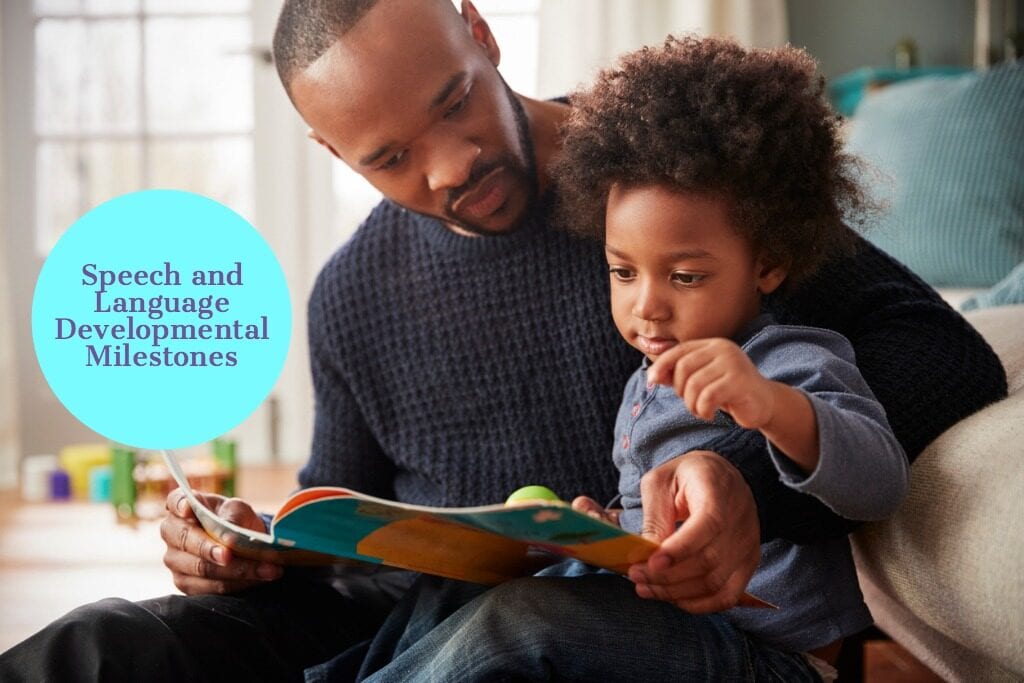Speech And Language Developmental Milestones

Speech and language are skills that we depend on to effectively communicate with the world and connect with those around us. As a speech pathologist, it is my job to help parents decide if their child may need speech therapy to assist in their language development. To help with this, I have listed some important milestones that children should develop in terms of speech and language development at different stages. This can help parents understand if any delays are present in their child, ensuring that action is taken at an early age. Early intervention may reduce the need for additional support during a child’s school years and increase a child’s chances of thriving in the school setting.
Milestones in Speech and Language Development
Speech and Language Skills at 3 Months Old:
- Smiling whenever you appear in their sight
- “Cooing” sounds
- Smiling when you talk to them
- Shows recognition of your voice
- Different cries depending on their needs
- Reacts to loud sounds
Speech and Language Skills at 6 Months Old:
- Makes gurgling sounds when playing with you or left alone
- Babbles in a speech-like manner and uses consonant different sounds, including sounds that begin with p, b, and m
- Uses his or her voice to express pleasure and displeasure
- Follows sounds with his or her eyes
- Responds to changes in the tone of your voice
- Notices that some toys make sounds
- Pays attention to music
- Laughs
Speech and Language Skills at 12 Months Old:
- Attempts to imitate speech sounds
- Says a few words, such as “dada,” “mama,” “uh-oh”, or “hi”
- Understands simple instructions, such as “Come here”
- Recognizes words for common items, such as “shoe” and “juice”
- Turns and look in the direction of sounds
- Enjoys playing peek-a-boo and pat-a-cake
- Listens when spoken to
- Responds to requests (“Come here”)
- Babbles using long and short groups of sounds (“tata, upup, bibibi”)
- Babbles to get and keep attention
- Communicates using gestures such as waving bye or holding arms up
Speech and Language Skills at 18 Months Old:
- Recognizes names of familiar people and objects
- Knows a few body parts and can point to them when asked
- Follows simple directions accompanied by gestures
- Says as many as 10 words
- Enjoys simple stories, rhymes, and songs
Speech and Language Skills at 2 Years Old:
- Uses simple 2 word phrases, such as “more milk”
- Asks 1-2 word questions, such as “Go bye-bye?”
- Follows simple commands and understand simple questions
- Says 50+ words
- Speaks well enough to be understood at least half the time by you or other primary caregivers
- Uses many different consonants at the beginning of words
- Says new words on a regular basis
- Points to pictures when named in books “where is the doggie?”
Speech and Language Skills at 3 Years Old:
- Has a word for almost everything
- Uses 2-3 word phrases to comment, label, and ask for things
- Uses k, g, f, t, d, and n sounds
- Speaks in a way that is understood by family members and friends
- Names objects to ask for them or to direct attention to them
Speech and Language Skills at 4 Years Old:
- Hears you when you call from another room
- Hears the television or radio at the same sound level as others
- Answers simple “Who?” “What?” “Where?” and “Why?” questions
- Talks about activities at daycare, preschool, or friends’ homes
- Uses sentences with 4+ words
- Speaks easily without having to repeat syllables or words
Speech and Language Skills at 5 Years Old:
- Pays attention to a short story and answers simple questions about it
- Hears and understands most of what is said at home and in school
- Uses sentences that give many details
- Tells stories that stay on topic
- Communicates easily with other children and adults
- Says most sounds correctly except for a few (l, s, r, v, z, ch, sh, and th)
- Uses rhyming words
- Names some letters and numbers
- Uses adult grammar
When Does Speech Therapy Become Necessary?
Up to 9% of young children in the US have some type of speech disorder. Speech and language delays become a concern when a child is not able to properly express their wants and needs, understand language, and/or socialize with their peers. It might also make it more difficult to place your child in a daycare center and to ensure they follow the same level of development and growth as other children of their age. If you have concerns about your child’s speech and language development, contact us for a consultation to find out if speech teletherapy is a fit for your child.
